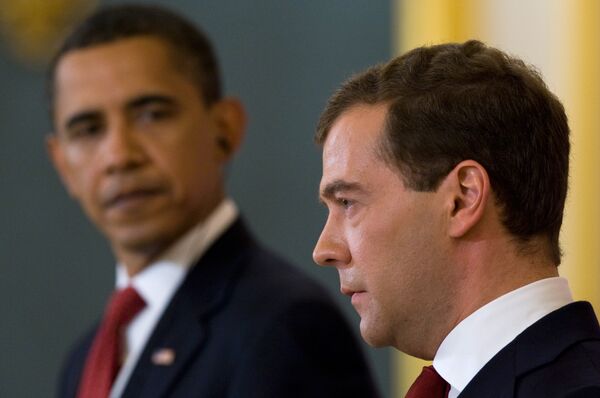WASHINGTON, July 7 (RIA Novosti) - U.S. media and experts generally hailed Monday's summit of Barack Obama and Dmitry Medvedev as reengagement on arms control and other military ties, but said little had really changed.
The two presidents signed a preliminary deal in the Kremlin to cut U.S. and Russian nuclear arsenals, while only exploring options for cooperation in missile defense.
The leaders also signed agreements allowing transit of U.S. troops and supplies via Russia to Afghanistan, restoring military cooperation, which was suspended after Russia's war with Georgia last August, and pledging joint non-proliferation efforts.
The Washington Post said the arms reduction agreement "was the most significant among those signed at a summit designed to show that 'resetting' relations between the two nations could bridge longstanding differences."
The paper said the deal "lays out a clear yet difficult path to replace a landmark arms-control treaty" that expires in December. The paper also said the leaders were unable to resolve a dispute over reductions in missile launchers and bombers, agreeing only that delivery vehicles should be lowered to 1,100-500 for each country.
"The wide range reflects continuing U.S. unwillingness to accept the Kremlin's demands for sharp cuts and could make it difficult for a new treaty to be negotiated and ratified before START expires," the paper said.
The Washington Times noted that the presidents put off the thornier issue of U.S. missile defense plans for Europe.
Obama agreed that offensive nuclear arms must be linked with discussions on defensive systems, which was a concession to Russian concerns over Washington's plans to deploy a missile base and radar in Europe. But he reiterated that the shield elements were aimed at states like Iran or North Korea, not Russia.
Medvedev said the inclusion of missile defense in talks was a major step. But the paper quoted U.S. officials as saying that "they are not negotiating away the European missile defense site." "Instead, they hope to convince Mr. Medvedev that the site cannot possibly be used against Russia."
Former Sen. Sam Nunn, co-chairman of the Nuclear Threat Initiative, which works to reduce the danger of weapons of mass destruction, said the summit represented a critical re-engagement on arms control, and said the military-to-military cooperation the two leaders agreed to will help, the paper reported.
The Washington Times called the summit friendly. "In their first extended meeting, Mr. Obama and Mr. Medvedev seemed at ease, even chatting as their deputies signed agreements on military cooperation and other civil affairs," the daily said.
Some analysts cited by the paper said Obama erred by not spending more time with Putin than their brief meeting, but others say "Obama's schedule shows he is trying to boost Medvedev's fortunes."
Ariel Cohen, senior research fellow at the Heritage Foundation, said Obama's talks in Moscow "left intact fundamental disagreements between the two countries, including the rights of post-Soviet states to sovereignty and territorial integrity," the paper reported.
Michael McFaul, director of Russian affairs at the National Security Council, said Obama made clear the U.S. would never recognize Abkhazia and South Ossetia, but as part of his new strategy of trying to get past differences he focused on efforts to deter another flare-up of violence in the Caucasus.
Russia recognized Georgia's two breakaway regions as independent states after the five-day August conflict that broke out as Tbilisi attacked South Ossetia to bring it back under control. The recognition was condemned internationally.
The influential Washington newspaper Politico said Obama faced a "daunting task" of resetting ties with Russia.
"On top of 50 years of icy Cold War mistrust, he has to deal with the aftermath of high-level U.S.-Russia turbulence during the Bush years, a period that began with the former U.S. president adoringly gazing into Vladimir Putin's soul and ended with the Russians furious over the Iraq war, missile defense and a general feeling from Washington that Moscow didn't much matter in the neoconservative view of the cosmos," the paper said.
"Even the immensely charismatic Obama couldn't wave a wand and magically change the mood no matter how hard he seemed to be trying on the grand stage at the Kremlin," it said.
The paper said citing experts that the biggest achievement of the summit, the framework arms reduction deal, was little progress.
"It's small progress. There are key issues being kicked down the road," said John Isaacs of the Center for Arms Control and Non-Proliferation. "There are a lot of details still to be worked out - a lot of devils still to go."
Isaacs also said he was troubled to hear of another fact the two presidents did not highlight. The framework reductions would take place over a seven-year period once the final treaty was signed and ratified. "I don't know why it would take seven years," the paper quoted him as saying.
Echoing that assessment, another expert cited by the paper, Lisbeth Gronlund of the Union of Concerned Scientists, said dropping the number of permitted nuclear delivery vehicles to between 500 and 1,100 showed that the two leaders were making only modest progress.





